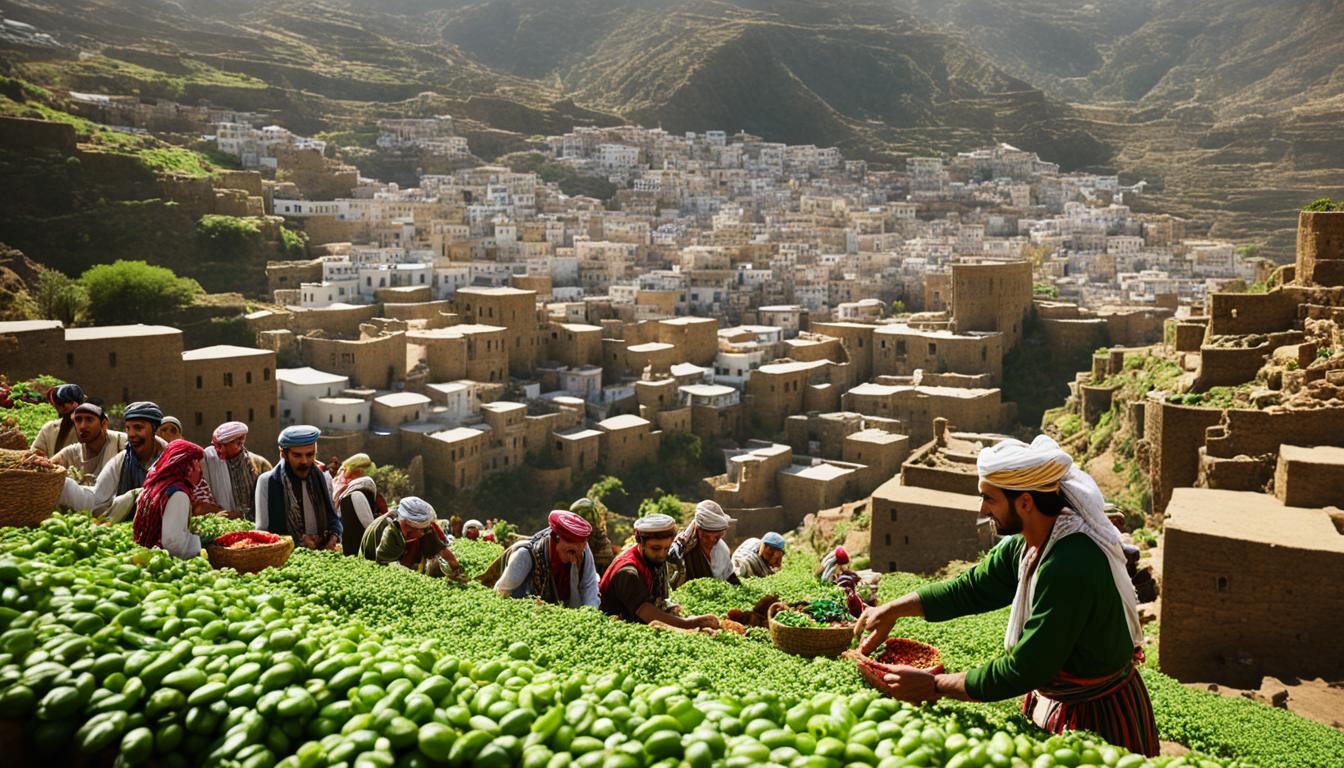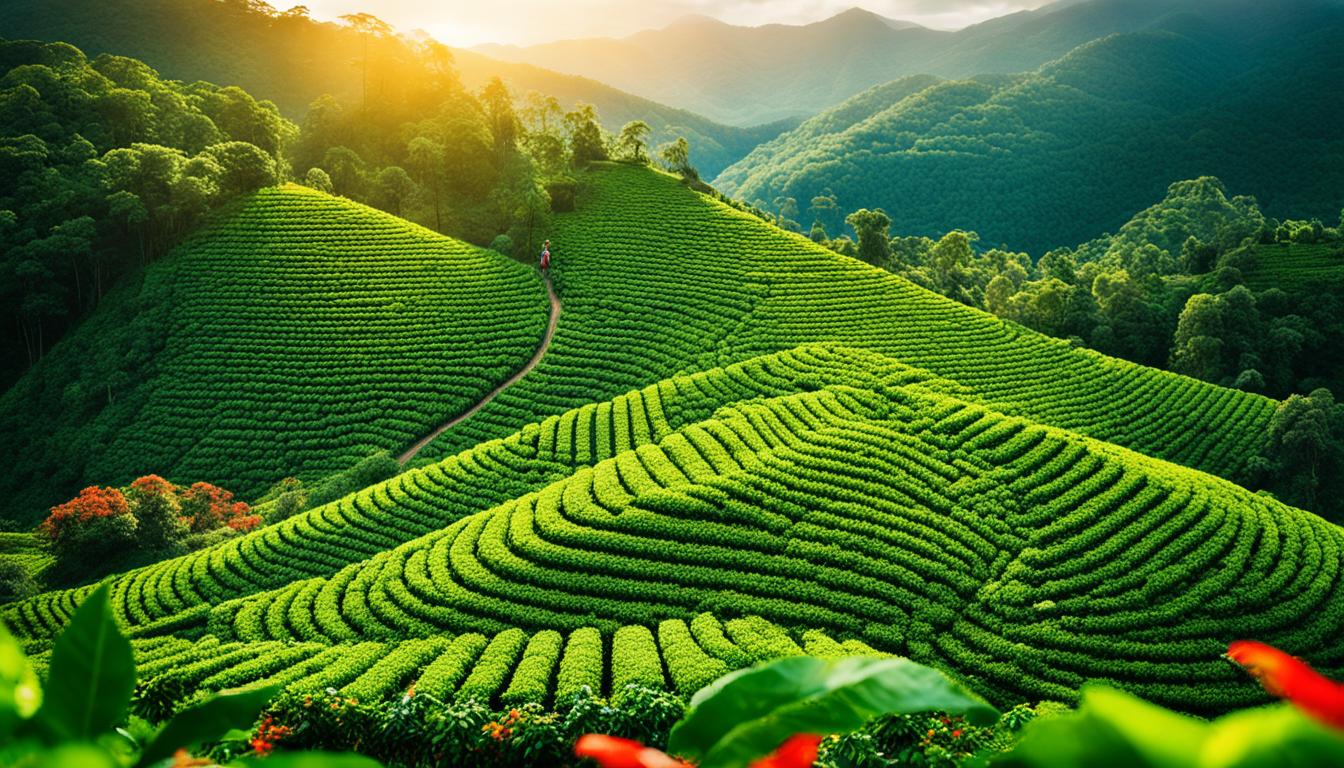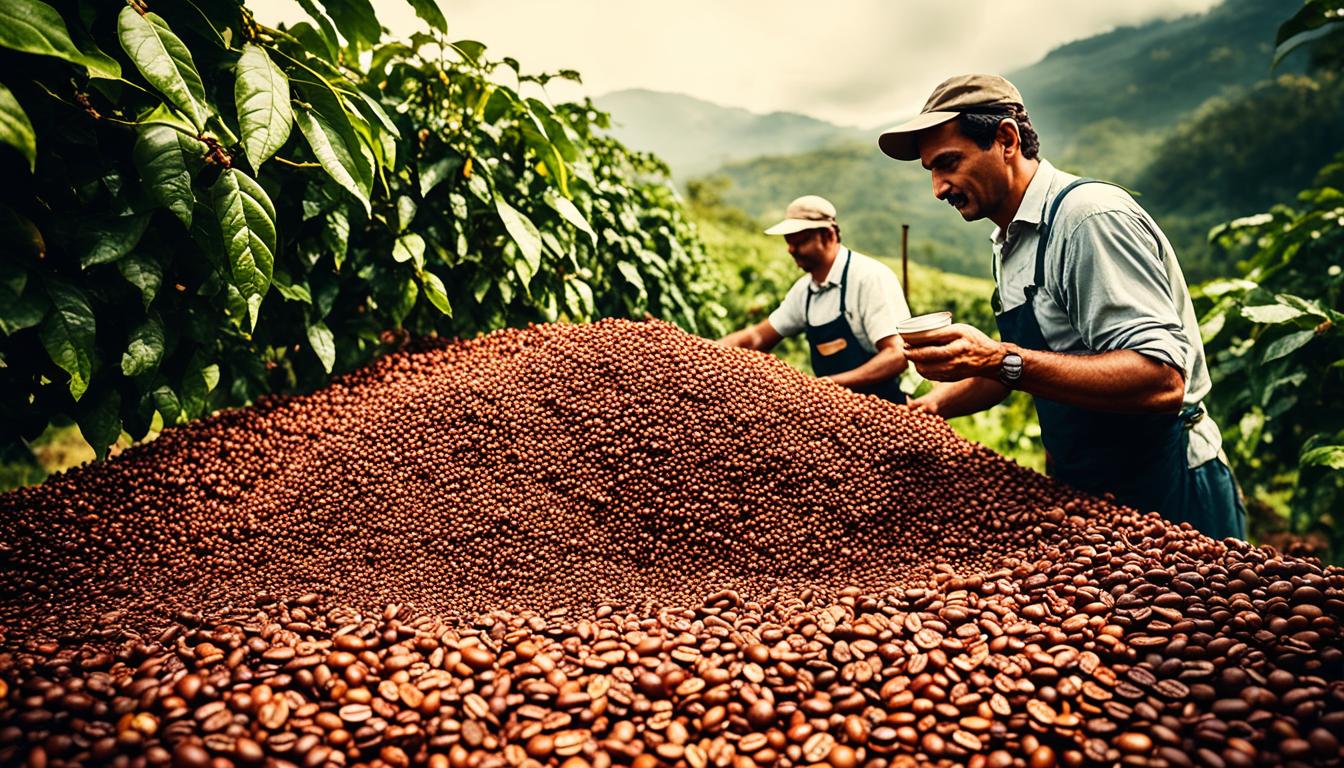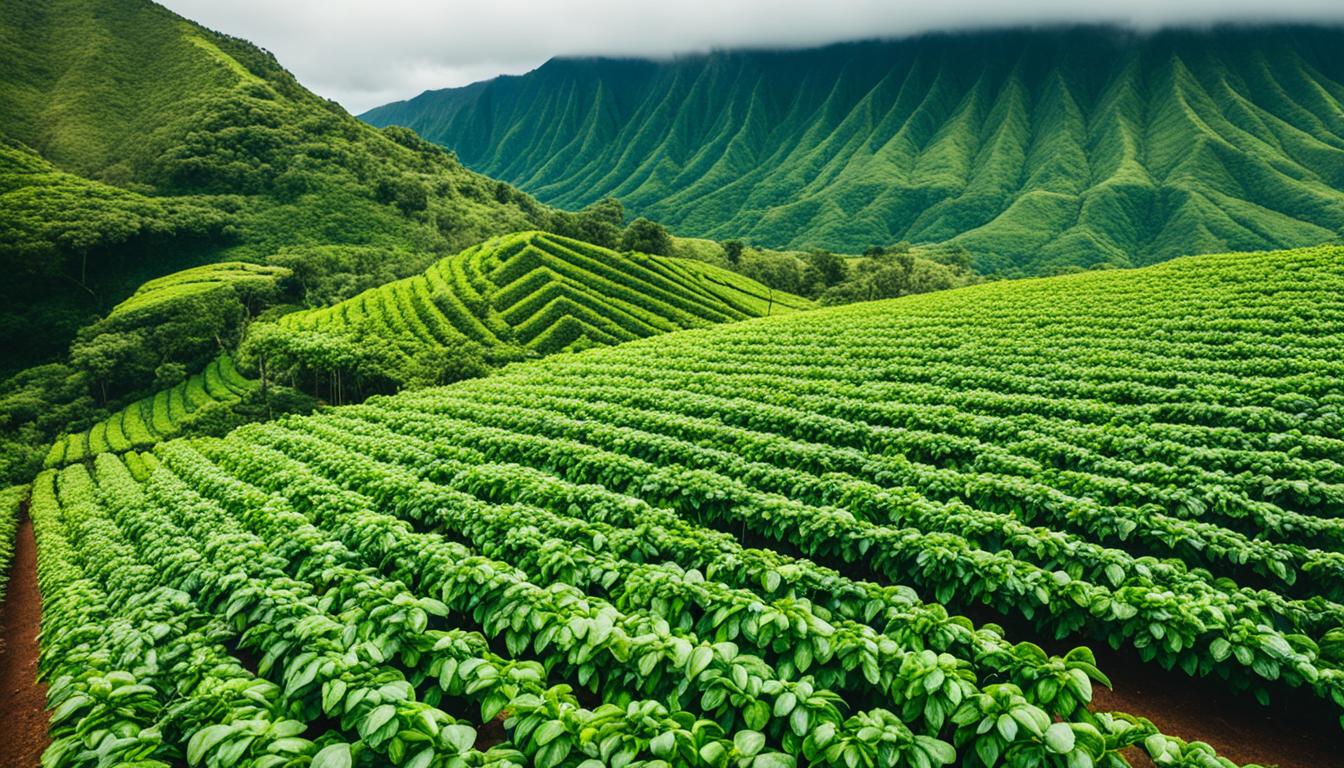Welcome to our journey to Yemen, a land steeped in history and known for its exceptional coffee. In this article, we will delve into the captivating origins, vibrant culture, and enduring heritage of Yemeni coffee. Join us as we explore the story behind this beloved beverage and the resilience of the Yemeni coffee industry.
Key Takeaways:
- The history of coffee in Yemen dates back to the 1400s, when Sufi mystics first brewed it for its stimulating effects during meditation.
- Yemeni Arabica coffee beans are renowned for their exceptional quality and rich flavors.
- Despite challenges from war, famine, disease, and political unrest, Yemen’s coffee industry has shown resilience and revival.
- Yemeni smallholders currently cultivate over 130,000 hectares of coffee, producing approximately 22,000 metric tons annually.
- Yemen’s coffee is in high demand, with significant exports to Saudi Arabia, the United States, and Japan.
The Rise of the Port of Mokha
The port city of Mokha played a crucial role in the global coffee trade during the 15th century. Coffee beans from various regions in Yemen, including the city of Al-Hudaydah, were transported to Mokha for export. The Yemeni Ottoman rulers tightly controlled the coffee trade, allowing only roasted coffee beans to leave the port, fearing that others would germinate the seeds.
This control was reminiscent of the strict policies of Chinese Silk Road traders who prohibited the smuggling of silkworms. However, Dutch traders from the Dutch East India Company managed to steal seven Arabica coffee seeds from Mokha in 1650 and transported them to their Indonesian colony, Java. This marked the beginning of commercial coffee plantations in Indonesia and eventually led to the establishment of the first coffeehouses in Europe. These coffeehouses played a significant role in intellectual and social discourse and helped fuel the Age of Enlightenment.
Yemen Coffee Production Today
Despite the challenges Yemen has faced in recent years, the country’s coffee industry is making a comeback. Yemeni smallholders currently cultivate over 130,000 hectares of coffee, producing an estimated 22,000 metric tons annually. However, compared to major coffee-producing countries like Brazil, Yemen’s production is relatively small.
The main coffee production regions in Yemen include Sana’a, Bani Mattar, Bani Ismail, and the Hiraz mountains. These regions have unique growing conditions, with altitudes ranging from 3,000 to 7,900 feet above sea level, fertile soils, and bountiful rainfall.
Coffee is hand-picked and dry-processed in Yemen, resulting in a deliciously sweet beverage. Yemeni coffee is known for its earthy, rich, and bold flavors, with notes of dried fruit, chocolate, and spices. The Mokha coffee from Bani Mattar is particularly famous for its complex, spicy, and honeyed aromas.
“Yemeni coffee, with its distinctive flavors and aromas, continues to captivate the taste buds of coffee enthusiasts worldwide.”
To further illustrate the unique characteristics of Yemeni coffee, below is a table highlighting the flavors and characteristics associated with the main coffee production regions in Yemen:
| Region | Flavor Profile | Characteristics |
|---|---|---|
| Sana’a | Fruity and Fragrant | Al-Sanani coffee is known for its vibrant fruit flavors and enticing aromas. |
| Bani Mattar | Complex and Spicy | Al-Mattari Mocha has a unique blend of spices, creating a rich and bold coffee experience. |
| Bani Ismail | Light and Delicate | Coffees from Bani Ismail offer a lighter intensity with subtle nuances of flavor. |
| Hiraz Mountains | Premium Organic | Organic coffees from the Hiraz mountains yield exceptional quality with prominent fruit flavors. |
Yemeni coffee is an embodiment of the rich cultural and geographical diversity of the country. Its distinct flavors, coupled with the traditional production methods, create a truly exceptional coffee experience.
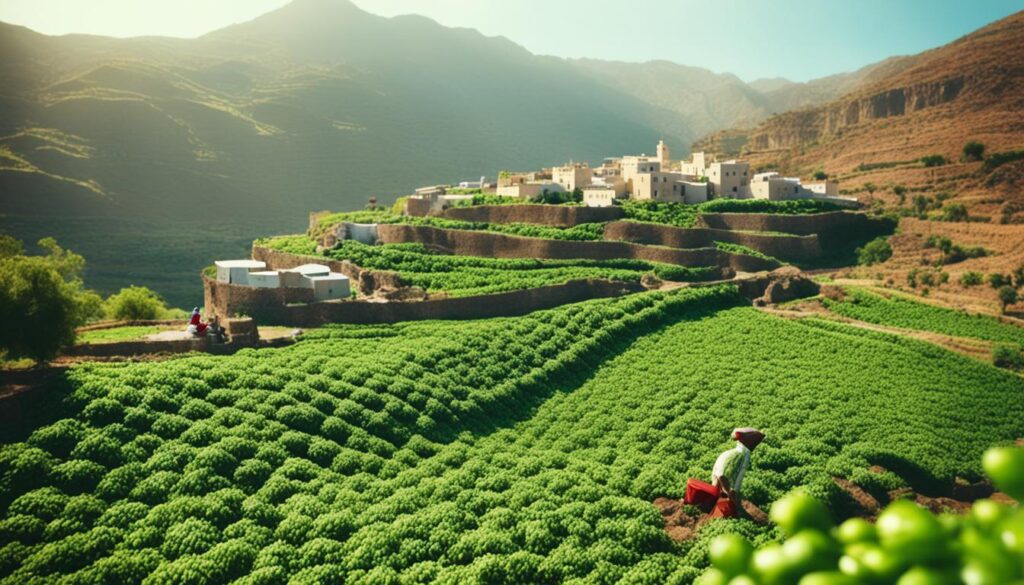
As Yemen’s coffee industry continues to recover and thrive, it not only provides livelihoods for the smallholders but also contributes to the preservation of Yemen’s coffee heritage and cultural identity.
The Future of Yemen Coffee
Despite the challenges Yemen’s coffee industry has faced, there is hope for its future. Efforts from organizations like GTZ Yemen, Pearl of Tahama, and Sheba Coffee, alongside the dedication of local specialty roasters, are helping to revive Yemen’s coffee heritage. Interest in Yemeni coffee has been resurgent in recent years, and there is a growing demand for its unique and high-quality beans.
One specialty coffee company, Qima Coffee, has discovered a new mother variety exclusive to Yemen called Yemenia, which shows exceptional cup quality. This variety has the potential to rival other specialty coffees such as Kopi Luwak, Blue Mountain, Geisha, and Kona.
As the civil war in Yemen subsides, it is predicted that the country’s coffee industry will come back stronger than ever, thanks to the resilience and dedication of coffee-growing families and other members of the local coffee chain.
| Benefits of Yemen’s Coffee Industry Recovery | Challenges Ahead |
|---|---|
| – Preservation of Yemen’s coffee heritage and legacy | – Rebuilding infrastructure destroyed by the war |
| – Revival of Yemen’s economy through increased coffee exports | – Ensuring fair trade practices for Yemeni coffee farmers |
| – Creation of employment opportunities for local communities | – Mitigating the effects of climate change on coffee production |
| – Showcasing Yemeni coffee as a unique and sought-after specialty in the global market | – Accessing international markets and managing logistics efficiently |
The future of Yemen’s coffee industry looks promising, with coffee enthusiasts worldwide eagerly awaiting the revival of Yemeni coffee’s distinct flavors and aromas. The resilience and dedication of the Yemeni people, coupled with support from organizations and growing interest in specialty coffees, are paving the way for a prosperous future for Yemen’s coffee industry.
Growing Regions of Yemeni Coffee
In Yemen, coffee is cultivated in various regions throughout the country. Each region has its own unique characteristics that contribute to the distinct flavors and qualities of Yemeni coffee.
Sana’a Coffee
The Sana’a growing region, located around Yemen’s capital city, has a rich coffee tradition that dates back to at least the 12th century. This region is known for producing the fruity and fragrant Al-Sanani coffee. The coffee beans from Sana’a are highly sought after for their delightful aroma and complex flavors.
Bani Mattar Coffee
The Bani Mattar mountains, Yemen’s highest coffee-producing region, are famous for cultivating the world-renowned Al-Mattari Mocha coffee. The beans from this area have distinct earthy and tobacco notes, with a grape-like acidity. Bani Mattar coffee is cherished for its bold and robust flavor profile.
Bani Ismail Coffee
To the west of Sana’a, you’ll find the notable coffee-growing area of Bani Ismail. This region, situated at high altitudes, produces unique coffees with small, pea-shaped beans that offer a lighter intensity. Bani Ismail coffee is characterized by its delicate flavors and smooth finish, making it a favorite among coffee connoisseurs.
Hiraz Coffee
The Hiraz mountains, located west of Sana’a, are renowned for their premium organic coffee. The high altitude and fertile soils in this region contribute to the exceptional quality of Hiraz coffee. It is known for its prominent fruit flavors, making it a delightful and refreshing choice for coffee lovers.
Each of these coffee-growing regions in Yemen adds its own distinct touch to the country’s coffee industry. From the fruity and fragrant Al-Sanani coffee of Sana’a to the bold and robust Al-Mattari Mocha from Bani Mattar, Yemeni coffee offers a wide range of flavors and experiences to explore.
| Region | Characteristics | Flavor Profile |
|---|---|---|
| Sana’a | Rich coffee tradition dating back centuries | Fruity and fragrant |
| Bani Mattar | Highest coffee-growing region in Yemen | Earthy and tobacco notes with a grape-like acidity |
| Bani Ismail | Located west of Sana’a at high altitudes | Lighter intensity with delicate flavors |
| Hiraz | Premium organic coffee with exceptional quality | Prominent fruit flavors |
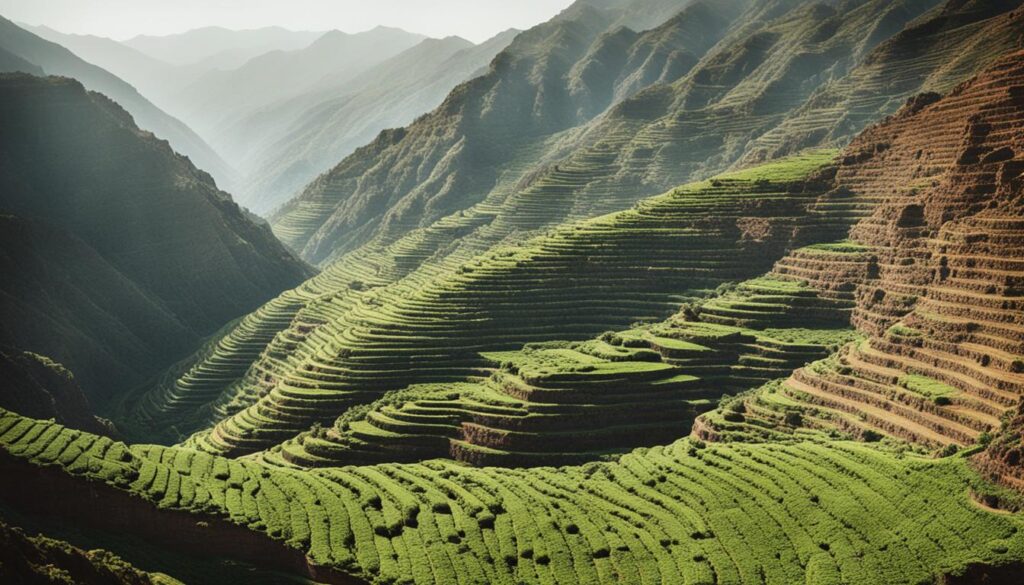
Conclusion
We can conclude that Yemen’s rich coffee legacy has made a lasting impact on the industry. Despite the challenges faced by the country, Yemeni coffee continues to be highly regarded for its exceptional flavors. The unique combination of dried fruit, chocolate, and spices creates a distinct and memorable taste experience.
Yemen’s traditional coffee production methods, including meticulous hand-picking and careful dry-processing, play a crucial role in delivering the exceptional quality that coffee enthusiasts around the world appreciate. These methods have been passed down through generations and contribute to the distinct flavor profile of Yemeni coffee.
The efforts to revive Yemen’s coffee industry, with the support of organizations and the dedication of local specialty roasters, are providing hope for the future. As the civil war subsides, we anticipate Yemen’s coffee industry to bounce back and reclaim its prominent position in the global coffee market. The resilience and passion of Yemeni coffee-growing families, combined with the country’s unique growing conditions, continue to capture the hearts and palates of coffee lovers worldwide.
FAQ
What is the history of coffee in Yemen?
Coffee has a centuries-old tradition in Yemen, dating back to the 1400s. It was first brewed by Sufi mystics for its stimulating effects during meditation. Coffee cultivation became a cornerstone of Islamic culture and hospitality.
What role did the Port of Mokha play in Yemen’s coffee trade?
The Port of Mokha was vital in the global coffee trade during the 15th century. Coffee beans from various regions in Yemen were transported to Mokha for export. The Yemeni Ottoman rulers tightly controlled the coffee trade, allowing only roasted beans to leave the port.
What challenges has Yemen’s coffee industry faced in recent years?
Yemen’s coffee industry has faced significant challenges, including war, famine, disease, and political unrest. However, efforts from organizations and the dedication of local specialty roasters are helping to revive Yemen’s coffee legacy.
How is coffee produced in Yemen today?
Yemeni smallholders currently cultivate over 130,000 hectares of coffee. Coffee is hand-picked and dry-processed in Yemen, resulting in a deliciously sweet beverage. Yemeni coffee is known for its earthy, rich, and bold flavors.
What is the future of Yemen’s coffee industry?
Despite the challenges, there is hope for Yemen’s coffee industry. Efforts from various organizations and the passion of local coffee-growing families are helping to revive the industry. As the civil war subsides, it is expected that Yemen’s coffee industry will rebound and regain its prominence.
What are the main growing regions of Yemeni coffee?
Yemen’s coffee is grown in regions such as Sana’a, Bani Mattar, Bani Ismail, and the Hiraz mountains. Each region has unique growing conditions that contribute to the exceptional quality and flavors of Yemeni coffee.
What is the legacy of Yemen’s coffee production?
Yemen’s coffee production has left a lasting impact on the industry. Yemeni coffee is highly regarded for its unique flavors and traditional production methods, such as hand-picking and dry-processing. The resilience of coffee-growing families and the country’s unique growing conditions contribute to the continued allure of Yemeni coffee.

